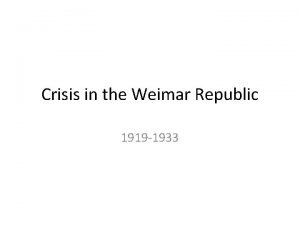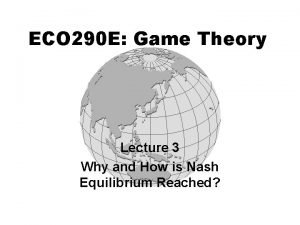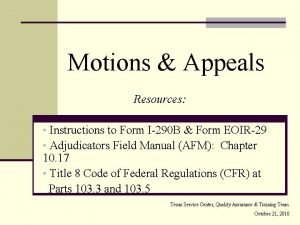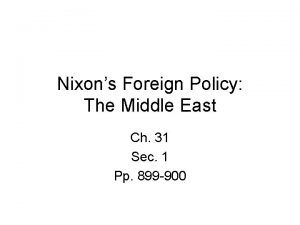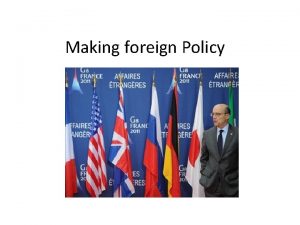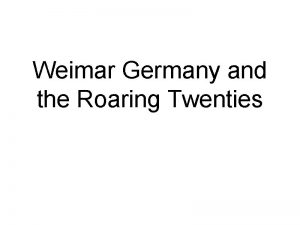HI 290 History of Germany Weimar Foreign Policy















- Slides: 15

HI 290 - History of Germany Weimar Foreign Policy

Gustav Stresemann (1878 -1929): Weimar’s Greatest Statesman? • 1907: Enters the Reichstag as the youngest Deputy. • 1917: Became parliamentary leader of the National Liberal Party. • 1918: Founder member of the DVP. • 1923: Served as Chancellor at the height of the Inflation Crisis. • 1923 -29: Served as Reich Foreign Minister in successive coalitions. • 1926: Received the Nobel Peace Prize • 1929: Dies of a stroke aged just 51.

Source: Mark Mazower, The Dark Continent: Europe’s Twentieth Century (1998)

The Treaty of Versailles Source: G. Layton, From Bismarck to Hitler 1890 -1933 (1993)

The War Guilt Clause (Article 231) “The Allied and Associated Governments affirm and Germany accepts the responsibility of Germany and her allies for causing all the loss and damage to which the Allied and Associated Governments and their nationals have been subjected as a consequence of the war imposed upon them by the aggression of Germany and her allies. ”

The Occupation of the Rhineland Soucre: R. Overy, The Penguin Historical Atlas of the Third Reich (1996) "The Honor Guard, " Caricature from Simplicissimus (March 1923) "Justice in the Ruhr Region, " Caricature from Simplicissimus (May 1923)

Reparations § The Allies needed reparations to cover the costs of the war. § Disagreement over how much Germany should pay and what percentage should be given to each of the Allies. § It was agreed that a Reparations Commission should be established to decide on a final figure by May 1921 – in the meantime Germany was required to pay a lump sum of 20 billion gold marks and raise a further 60 billion through the sale of bonds. § Jan. 1921: the Allies present Germany with a bill for 226, 000 billion marks to be paid over 42 years. The Germans suggest the alternative figure of 30 billion marks. § April 1921: The Reparations Commission sets the total amount to be paid at 152, 000 billion marks and Germany is given a month to agree to this figure. “They certainly don’t have a visa. . . ” Simplicissmus (1923) comments on the payment of ‘reparations in kind’.

The Rapallo Treaty (1922) § Treaty signed between Germany and the Soviet Union in April 1922. § Re-established full diplomatic relations between Germany and Russia – Germany the first nation in the world to formally recognize the USSR. § Both countries renounced claims to war debts and reparations, and agreed to cooperate over economic matters. § Secret clauses of the Treaty allowed Germany to circumvent the military clauses of the Treaty of Versailles by training troops and developing forbidden weapons (tanks, an airforce etc. ) on Russian soil. Foreign Minister Walther Rathenau (1867 -1922)

The Ruhr Crisis, 1923 -24

The Locarno Treaties (1925)

“Locarno…is the achievement of lasting peace on the Rhine, guaranteed by the formal renunciation of force by the two great neighbouring nations and also by the commitment of other states to come to the aid of the victim of an act of aggression in violation of this treaty…It can and it ought to be the basis for a general cooperative effort among these nations to spread peace wherever their material power and moral influence reach. ” Gustav Stresemann, 1926

Rehabilitation § 1926: Germany allowed to join the League of Nations. § 1926: Treaty of Berlin with USSR reaffirms the agreements made at Rapallo in 1922. § 1928: Germany signs the Kellog-Briand Pact, thereby renouncing the use of force and committing herself to disarmament. § 1929: The Young Plan – a revised scheme for repaying Reparations. The allies agree to evacuate the Rhineland early.

Foreign Policy After Stresemann § 1930: Withdrawal of Allied troops from the Rhineland. § Change of gear after Stresemann: more assertive foreign policy under Curtius and Brüning. § 1931: Proposed customs union with Austria. § June 1932: One year moratorium on reparations. § July 1932: Withdrawal from International Disarmament Commission. § 1932: Lusanne Agreement – ends reparations. Stresemann’s successor as Foreign Minister, Julius Curtius (right), with Chancellor Heinrich Brüning, July 1931

Stresemann – a good European? Yes • Conciliatory cooperative policy towards France and Britain. • Germany joins League of Nations. • International recognition Nobel Peace Prize (together with Aristide Briand). • • No Economic pressure on Poland. Germany as advocate of rights of German minorities in Eastern Europe. Letter to Crown Prince: readjustment of Eastern borders and liberation of Germany from foreign domination. Illegal military cooperation with Soviet Russia.

Was Stresemann successful? Foreign Policy • Reparation payments now clear. • American investment. • Beginning of reconciliation with France and integration into European policies. • Early withdrawal of French troops from Ruhr and later from Rhineland. • No territorial revisions in the East. Effects on domestic policy • German public opinion violently against amount and length of payments. • German financial system dependent on American money. • Public opinion: Germany gained too little by renouncing claim to Alsace-Lorraine. • Disappointment. Without doubt constructive and successful foreign policy in longer term perspective, in shortterm perspective was not supported by German public opinion – was not able to give additional legitimacy to Weimar democracy.
 Weimar unemployment
Weimar unemployment Political spectrum line
Political spectrum line Here you are too foreign for home
Here you are too foreign for home Tceq 290
Tceq 290 A 290. számú auschwitzi fogoly
A 290. számú auschwitzi fogoly Eco 290
Eco 290 Form i290
Form i290 Specs 290 and jones
Specs 290 and jones Cs 290
Cs 290 Uib290
Uib290 1790 foreign policy
1790 foreign policy Foreign policy of louis philippe
Foreign policy of louis philippe What was thomas jefferson foreign policy
What was thomas jefferson foreign policy Nixons foreign policy
Nixons foreign policy Nixons foreign policy
Nixons foreign policy Actors in foreign policy
Actors in foreign policy
